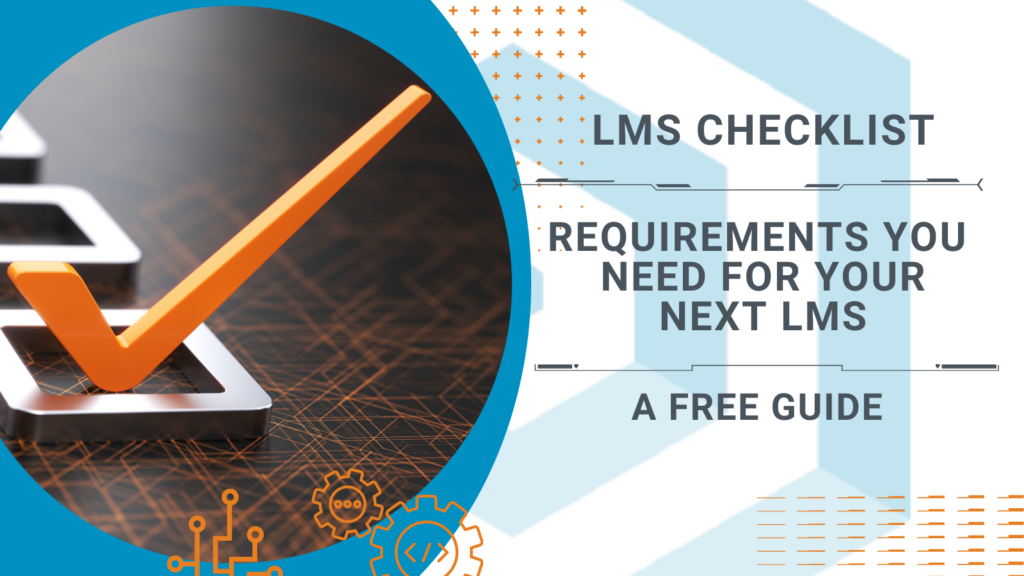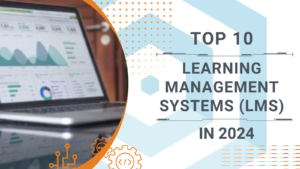Choosing the right Learning Management System (LMS) is a significant decision for any organization, especially since 67% of companies expect to increase their learning and development (L&D) budgets this year. This underscores the importance of making an informed choice.
What should you prioritize in your next LMS? It’s not just about impressive features—it’s about finding a system that resonates with your team’s unique learning management style. Our comprehensive LMS requirements checklist is designed to help you sift through the noise and focus on what’s truly important for your organization.
This guide emphasizes key features that significantly enhance the learning experience. Ultimately, this ensures that your investment in eLearning is not only wise but also delivers measurable results and benefits to your organization.
Key Takeaways
- Comprehensive Course Management: Ensure the LMS offers intuitive tools for creating, organizing, and updating courses, including multimedia integration and structured learning paths.
- User Management: Look for strong user profile management, including roles, permissions, and streamlined enrollment processes to enhance security and ease of use.
- Tracking and Assessments: Choose an LMS that provides detailed tracking of learner progress and performance, along with varied and automated assessment tools for effective learning evaluation.
- Certifications and Badgings: Incorporate features like certifications and badging to motivate learners and make the learning experience more interactive and rewarding.
- Customization and Integration Capabilities: Select an LMS that allows branding and language customization and offers API access for seamless integration with existing tools, ensuring scalability and a personalized learning environment.
Here is a list of features and functionality that you should plan for and make sure are adequately configured during the transition:
LMS Core Functionality
An LMS is a centralized platform that streamlines delivery, tracking, and management of learning activities. It’s a hub where learners access educational content, participate in training activities, and complete assessments while administrators can monitor progress and manage resources.
As you consider upgrading or selecting a new LMS, focusing on key functionalities that align with your organizational needs is crucial. Here are the five core features to look for when selecting an LMS:
Course Management
Course management empowers administrators to skillfully create, modify, and oversee online courses. This admin-centric feature facilitates the seamless integration of diverse multimedia content, enhancing the course’s appeal and effectiveness.
It also includes the capability to design and incorporate various quizzes and assignments, enabling a more interactive and engaging learning journey. This comprehensive toolset ensures administrators can tailor the educational content to meet specific learning objectives and styles.
Open edX Studio offers Appsembler users several innovative features, particularly in Studio Tahoe. These include:
- Drag and Drop Tools: This feature simplifies course organization, allowing admins to arrange course materials efficiently. It enhances user experience by making course creation more intuitive and less time-consuming.
- Building and Releasing Courses in Sections: This capability allows admins to release course content in manageable segments. It’s beneficial as it enables control over the learner’s pace and facilitates frequent course updates without disrupting the learning process.
- Creating Learning Paths: Admins can design structured learning paths for students, guiding them through the course material logically and progressively. This feature ensures a more organized learning experience, helping students absorb and retain information better.
Incorporating these features into your LMS requirements checklist ensures a robust and user-friendly course management system. With its advanced functionalities, Studio stands out as a comprehensive solution for effective course management in an LMS.
User Management
User Management in LMS involves user profiles, roles, permissions, and enrollment processes, which are crucial for maintaining structure and security. It ensures users access appropriate resources and courses tailored to their roles and learning needs.
Administrators manage sensitive content and control content editing and publishing through roles and permissions. Streamlined, automated enrollment processes reduce administrative workload and improve user experience by offering immediate access to learning materials.
These tools are indispensable for an efficient, secure, and user-friendly LMS, focusing on education and enhancing the learning experience for all involved, optimizing administrative efficiency and educational effectiveness.
Progress Tracking
Progress tracking, a key element in LMS core functionality, which involves monitoring and reporting learners’ progress and performance. It’s vital for assessing course effectiveness and helping administrators identify engagement drop-offs and problematic content.
This feedback is crucial for enhancing course quality and ensuring engaging and beneficial materials. Including progress tracking in an LMS checklist is essential, as it improves the learning experience and equips administrators with data for continual content refinement.
Its feature ensures the LMS adapts to users’ evolving needs, making it an indispensable component of an effective learning management system.
Assessments
Incorporating a variety of assessments in an LMS is crucial for an effective learning process. This flexibility allows educators to accurately evaluate learner progress through different stages.
The feature of automated grading is particularly notable and especially beneficial for summative assessments. These assessments focus on evaluating smaller, specific learning segments, offering immediate feedback. Automated grading significantly enhances the efficiency of the learning experience, freeing up valuable time for instructors and administrators.
A comprehensive LMS should include this versatile assessment capability, ensuring both educational effectiveness and administrative ease, as detailed in a well-considered LMS requirements checklist.
Certifications and Badging
Certifications and badging, often called gamification features in an LMS, significantly enhance the learning experience. These features boost user engagement and provide external motivation, making learning more interactive and rewarding.
Through certifications and badges, gamification taps into the learners’ desire for achievement and recognition, increasing their commitment to the course material.
Customization and Branding
The impact of customization and branding in an LMS like the Appsembler dashboard can’t be overstated. It’s a powerful tool for making users feel at ease and connected to your brand. However, it’s crucial to find a balance. Excessive customization might detract from the learning experience. The key is to integrate your brand smoothly, ensuring it enhances rather than dominates the learning environment.
Custom Domain
A custom domain in your LMS isn’t just a URL but the digital front door to your brand’s learning environment. It’s about making your LMS uniquely yours, enhancing brand recognition and trust. Easy to set up, a custom domain transforms your LMS into a familiar, branded space, making it more than just a platform – it’s a part of your digital identity.
Branding
Branding in an LMS is a critical factor for enhancing learner engagement and creating a cohesive educational experience. A good LMS understands this importance and offers administrators extensive customization options. It gives admins the ability to tailor the LMS to reflect their organization’s unique brand identity.
This includes the ability to integrate specific logos, select custom color schemes, and apply distinct themes that resonate with the organization’s aesthetic. Such customization not only reinforces brand presence within the learning environment but also fosters a sense of familiarity and alignment for users, enhancing their overall learning experience.
This customization transforms the LMS into a digital representation of the corporate identity, offering a professional yet personal learning experience. Every user interaction reflects the organization’s ethos by embedding distinct branding, as seen in courses like ‘Redis for Java Developers.’
Examples like Dremio illustrate the impact of unique visuals and color schemes. LMS customization capabilities ensure a cohesive, inviting learning environment, making branding a vital feature for engaging, effective software.
Language Customization
Did you know that over 40% of global customers will only buy products in their languages? Embracing language customization is not just nice but necessary for reaching and effectively training a diverse audience.
Tailoring your LMS to support multiple languages can significantly enhance the learning experience, ensuring that all learners, regardless of their native language, feel included and fully engaged with the content.
Communication and Engagement
Collaborative learning transforms an LMS from a simple platform into a thriving community. Learners who interact and share deepen their understanding in ways solo study can’t match.
Your next LMS should be more than a repository of information but a lively forum for shared discovery. Look for features encouraging real-time discussions and group projects, turning the learning journey into an engaging, collective experience.
Discussion Forums
Discussion forums in an LMS create a vibrant learning community, providing a platform for sharing insights and challenging ideas, thereby enriching the learning journey. Their effectiveness hinges on promoting thoughtful participation, emphasizing the quality of discussions over the number of posts.
This strategy encourages meaningful contributions, steering clear of superficial posts made to meet quotas. Properly configured, these forums foster a dynamic learning environment where each contribution is valuable and every learner’s perspective is heard.
Such forums enhance understanding and develop critical thinking skills, making them a fundamental feature for a successful and interactive learning experience.
Notifications and Announcements
Striking the right balance with notifications and announcements in an LMS can be challenging. Tailoring notifications to be system-wide or course-specific allows for targeted communication. This customization ensures learners receive relevant updates, enhancing their engagement with the course material.
However, avoiding notification overload is essential, as too many alerts can lead to disengagement. Finding this balance keeps learners connected and informed, making their educational experience efficient and enjoyable.
Email Integration
Email integration in an LMS is crucial for supporting busy learners, linking their hectic schedules with learning objectives. It sends email reminders, nudging learners back to the LMS to stay on course.
This feature ensures essential updates and communications are noticed, keeping learners informed and engaged. It’s a straightforward, effective method to enhance the learning experience, helping even the busiest users maintain their educational progress.
Integration and Scalability
Choosing an LMS requires forward-thinking, with integration and scalability being key factors. These elements ensure the LMS complements your existing tools and adapts to future growth. This transforms the LMS from a static platform to a dynamic partner in education, capable of evolving with your expanding courses and needs. An LMS needs to remain practical and relevant as your educational ambitions and requirements grow.
API Access
When selecting a new LMS, it’s imperative to verify the availability of API integrations, as this ensures the system can seamlessly connect with a diverse array of technological tools. A solid LMS sets a high standard in the market with its superior integration capabilities.
- Broad API Access: A key feature of modern LMS is their comprehensive API access. Unlike some LMS platforms that limit API utilization, advanced systems offer extensive access. This capability allows for seamless integrations with a wide range of digital tools and applications, enabling fluid interactions with external systems. In today’s technology-driven educational environments, such broad API access is essential, empowering educators and learners to efficiently leverage diverse digital resources.
- Native Integrations Galore: Advanced LMS platforms often stand out with their native integrations. They provide direct, built-in connections with widely used tools such as CRM systems like Salesforce. These integrations are deeply integrated into the platform’s architecture, creating a seamless user experience. This promotes an intuitive and efficient workflow, enhancing user engagement and productivity. By simplifying the integration process, these LMS platforms allow users to focus more on learning and less on technical complexities.
- OpenAPI Flexibility: Compatibility with OpenAPI standards is a hallmark of adaptable and flexible LMS platforms. This feature enables integration with a broad range of tools, ensuring the LMS stays current with emerging technologies and industry trends. An LMS that embraces new tools and standards is a future-proof investment for organizations looking for sustainable digital learning solutions.
- Custom Integration Promise: A distinguishing feature of some leading LMS platforms is their commitment to custom integration. Understanding the dynamic nature of technology needs, these systems don’t just offer support but actively develop new integrations. This approach ensures that as users’ technology requirements grow, the LMS evolves alongside, providing a consistently relevant and efficient learning experience.
Third-Party Plugins
Third-party plugins transform an LMS from a primary platform into a dynamic powerhouse, enhancing learning and integration capabilities. Overlooking these plugins while selecting an LMS may result in a rigid, non-adaptive system that needs to be equipped for future educational and technological developments.
Thus, incorporating third-party plugins is crucial for preparing your LMS to meet tomorrow’s challenges and opportunities.
Scalability
Scalability is critical when selecting an LMS, akin to buying a house with room for growth. It involves picking a system that meets current needs and accommodates future expansion in users and courses.
With scalability, you can avoid confining your evolving educational needs to a constricting LMS, and migrating to a new system later is an unnecessary hassle.
Data Analytics
In the realm of digital learning, it’s crucial for a LMS to have robust analytics capabilities. Features that enhance the functionality of an LMS include:
- Performance Metrics: Detailed insights into learner interactions with courses are essential. Administrators should be able to quickly identify successful aspects of a course and areas needing improvement, aided by clear performance metrics.
- Learner Engagement: Monitoring how learners interact with content is key. This enables educators to adjust courses to maintain and increase learner interest, ensuring the material remains engaging and relevant.
- Completion Rates: Understanding course completion rates is vital in assessing the effectiveness of a course. An LMS should provide these essential metrics, allowing educators to pinpoint successful courses and those that might be falling short.
- Tailored Learning Experiences: Insights from analytics tools should empower educators to create customized learning paths tailored to individual learner needs, enhancing the overall learning experience.
- Predictive Analysis: An advanced feature in some LMS platforms is predictive analysis, offering foresight into future learning trends and patterns, which is invaluable for planning and scaling educational content.
An example of an LMS that incorporates these advanced features is Appsembler with Figures. It represents a significant advancement in learning analytics, providing a comprehensive suite of tools. Figures demystify the complexities of online learning, enabling organizations to meticulously track and improve the learning journey. This system ensures educational initiatives are as impactful and efficient as possible, making it an indispensable asset for any learning-oriented organization.
Reports
Custom reports in an LMS go beyond mere data presentation, offering insights aligned with your educational goals. These reports act as a toolkit, enabling you to concentrate on metrics that reflect your objectives.
Whether assessing learner engagement or monitoring course completion rates, this tailored approach transforms data into a strategic asset. It’s not just about gathering information—it’s about leveraging it to enhance educational outcomes, ensuring every piece of data contributes.
Technical Aspects
The technical aspects of an LMS are its backbone, ensuring everything clicks into place. These features, from smooth integrations to robust data security, elevate the user experience.
The nuts and bolts keep the platform running seamlessly, making learning accessible, secure, and efficient. In this digital age, technical finesse turns a basic platform into an interactive and effective learning environment where learners and educators find everything they need at their fingertips.
Mobile Compatibility
Mobile compatibility in a Learning Management System (LMS) is vital for contemporary learners, enabling access to education anytime, anywhere. It accommodates busy schedules and supports varied learning preferences, making education more accessible and aligned with modern lifestyles.
An LMS with strong mobile compatibility enhances the learning experience by offering convenience and flexibility, meeting learners’ needs in today’s fast-paced world.
Accessibility
Ensuring an LMS complies with standards like the Web Content Accessibility Guidelines (WCAG) is crucial, extending beyond legal compliance to foster inclusivity. This vital step ensures the platform is accessible to all learners, regardless of their abilities, creating an equitable learning environment.
Such adherence promotes inclusivity and protects your organization, safeguarding against potential accessibility-related legal issues. Prioritizing accessibility reflects a commitment to inclusive and equitable education for every user.
Security
Securing your LMS is essential, especially in sensitive sectors like IT and education. Advanced measures like data encryption and secure access controls are crucial to protect against sophisticated cyber threats and comply with laws like GDPR.
These features prevent unauthorized access, ensuring user trust and safeguarding sensitive information, making robust security not just a feature but a fundamental necessity for any effective LMS.
Backup and Recovery
A robust backup and recovery system is crucial in an LMS, safeguarding against glitches or data loss. It’s essential to have regular, automated backups for educational content and user data, ensuring continuity and security.
Opting for an LMS with an efficient recovery process minimizes downtime, protecting the digital learning environment. A robust backup and recovery strategy is indispensable in a digital era where data is invaluable.
Support and Training
Selecting an LMS with top-notch support and training is a crucial step towards a successful learning experience. This choice ensures faster adoption of the platform and boosts user engagement.
Effective support transforms the learning curve from a challenge to an opportunity, enhancing the overall experience. A well-supported LMS journey empowers users, fostering a vibrant and interactive learning community. Strong support is the cornerstone of a seamless and productive LMS experience.
Helpdesk and Support
A reliable helpdesk and support team is the backbone of any LMS, ensuring smooth and efficient user experiences.
They often excel in their commitment to customer support. Think tailored training to ensure users are fully capable of leveraging the platform’s capabilities. Sometimes they even feature comprehensive learning resources, like dedicated training academies or extensive knowledge bases.
Moreover, the support structure of these systems usually includes readily accessible customer service teams, offering immediate assistance and guidance through phone and chat options. This robust support framework is essential for an effective and seamless LMS experience, empowering users to make the most out of their digital learning environment.
Documentation
Using a Learning Management System (LMS) must be straightforward, not a maze. Good internal guides make this a reality. When your team and users can access clear, easy-to-follow documentation, they can fully leverage the LMS’s capabilities.
Opting for an LMS known for its user-friendly documentation is an innovative move. This choice significantly eases the learning process and fosters an environment where users can independently thrive and utilize the system effectively.
Training Programs
Practical training for instructors and learners is crucial when transitioning to a new LMS, ensuring they are confident and adept in using the platform. This training helps them adjust smoothly, fostering competence and comfort in the new digital environment.
Training methods vary, catering to different learning styles. Modern LMS provides a range of training formats tailored to meet the needs of different learners:
- On-demand Course, Assessor Marked: Learners progress at their pace, with evaluations conducted by an instructor.
- On-demand Course, Automated: This format allows for self-guided learning with automated assessments.
- Instructor-led Asynchronous: Flexibility is key here, with courses that are led by an instructor but do not require real-time participation.
- Instructor-led Synchronous: These sessions are live, allowing for immediate interaction and feedback from the instructor.
Offering these diverse options ensures all users effectively engage with and benefit from the LMS, enhancing learning experiences and fully utilizing LMS capabilities.
Continuous Improvement
An effective LMS grows with your team’s learning curve. As your understanding of best practices and your content area deepens, so should the LMS capabilities. This approach ensures your LMS stays relevant and continues to meet the evolving needs of your learners. The key is to maintain an adaptable and responsive LMS to new insights and educational trends, preventing it from becoming obsolete in the fast-paced world of digital education.
Feedback Mechanisms
In an LMS, feedback mechanisms are crucial, offering direct insight into learners’ experiences. Post-course surveys are essential, as they gather valuable input, shaping future courses to better resonate with users.
This process ensures LMS content remains relevant, and engaging, and improves continually. Leveraging honest user feedback is a dynamic method to keep the educational material aligned with learners’ needs, preferences, and evolving educational trends.
Feature Updates
Staying updated with the latest features and enhancements of your LMS is crucial. Subscribing to newsletters or emails from your LMS provider, like following the Appsembler Roadmap, keeps you informed about new functionalities and updates.
This proactive approach ensures you fully leverage your LMS’s capabilities, not just keeping pace but also staying ahead and integrating new features to improve the learning experience continually.
Check Off Your List with Appsembler
When selecting your next LMS, consider Appsembler’s Tahoe LMS, a leading choice in the field. This platform goes beyond just checking boxes, it revolutionizes the approach to learning management.
Tahoe LMS is designed to evolve with organizational needs, providing a dynamic and adaptive learning experience. Committed to continuous improvement, Appsembler regularly updates and refines its system, ensuring an efficient and user-friendly interface. Ideal for those seeking to elevate their LMS, Tahoe LMS stands out for its excellence.
Discover how Appsembler can transform your learning management by requesting a demo and experiencing its impactful capabilities firsthand.



